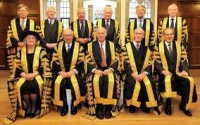Judgment Has Been Given By The Supreme Court Of The United Kingdom In The Following Case
Sunday 21 July, 2019 Written by Simon Collyer
Secretary of State for Work and Pensions (Appellant) v MM (Respondent) (Scotland) – UKSC 2017/0215
On appeal from the Inner House, Court of Session, Scotland
The respondent ("MM") is a 47 year old man who has suffered from anxiety and depression for six years. He is heavily reliant on his partner's assistance for daily living, including in social situations. In 2015 he made a claim for personal independence payment ("PIP"). This was refused by the Secretary of State for Work and Pensions on the basis that he had not scored at least eight points in respect of either daily living activities or mobility activities, as required under the Social Security (Personal Independence Payment) Regulations 2013. His appeal to the First-tier Tribunal ("FTT") was refused. The FTT increased the number of points awarded, but this was still insufficient to meet the eight points threshold for either component. In respect of his ability to engage people face to face ("Activity 9"), the FTT awarded two points. MM appealed to the Upper Tribunal ("UT"), against the FTT's decision on activity 9. He contended that his case fell within descriptor 9c ("needs social support to be able to engage with other people") rather than 9b ("needs prompting to be able to engage with other people") with the consequence that he should have been awarded four points for Activity 9, rather than two. The UT allowed his appeal and remitted the case for rehearing by a differently constituted FTT. In so doing, the UT gave directions on the meaning of "social support" in descriptor 9c. This included that there may be situations under 9c where a qualified person can provide social support non-contemporaneously, and that social support can include "prompting" subject to the requirement that it has to be from a person trained or experienced in assisting people to engage in social situations. The Inner House dismissed the Secretary of State’s appeal against the decision of the UT.
The issue is:
Where a claim to personal independence payment under the Social Security (Personal Independence Payment) Regulations 2013 is based on a person needing social support to be able to engage with other people: (1) must the social support needed be contemporaneous with the engagement being supported? (2) does anything that constitutes needing "prompting" to be able to engage with other people also constitute social support, subject to it being provided by a person trained or experienced in assisting people to engage in social situations?
JUSTICES: Lady Hale (President), Lord Kerr, Lord Hodge, Lady Black, Lord Sales

Image: UK Supreme Court
BACKGROUND TO THE APPEAL
This appeal concerns the assessment of claimants for personal independence payment (‘PIP’), a non-means tested allowance paid to certain people with long term health problems or disability. The appeal’s focus is on one of the markers used to determine the extent to which the ability of claimants to carry out daily living activities is limited by their physical or mental condition. The particular activity in question is ‘engaging with other people face to face’ and the issue is the interpretation of descriptor 9c found in Part 2 of Schedule 1 to the Social Security (Personal Independence Payment) Regulations 2013 (‘the Regulations’). The Regulations are made under Part 4 of the Welfare Reform Act 2012 (‘the Act’). Descriptor 9c reads: ‘Needs social support to be able to engage with other people’.
The respondent is a man in his forties. He made a claim for PIP in February 2015. His entitlement to the daily living component of the allowance at the standard rate depended on whether he satisfied descriptor 9c, which would give him 4 points towards the required score of at least 8 points overall under regulation 5. His claim was rejected on the ground that his ability to engage with other people face to face only satisfied descriptor 9b, ‘Needs prompting to be able to engage with other people’, which gave him a score of 2 points.
The respondent appealed unsuccessfully to the First-tier Tribunal (‘FTT’). His appeal to the Upper Tribunal was allowed on the ground that the FTT had given an inadequate explanation of why he satisfied descriptor 9b rather than 9c. The case was remitted to the FTT for rehearing and directions were given as to the interpretation of descriptor 9c. The appellant Secretary of State appealed to the Inner House of the Court of Session in relation to the directions. The Inner House refused the appeal while modifying some of the directions. The Secretary of State appealed to the Supreme Court.
Before the Supreme Court the Secretary of State accepted that the ‘social support’ required for descriptor 9c may consist of ‘prompting’, as with 9b, but for this descriptor the support had to be ‘from a person trained or experienced in assisting people to engage in social situations’. Whilst he accepted that a friend or family member who knows the claimant well could have the relevant training or experience, he argued that a need for help simply from someone familiar or trusted was not sufficient (‘the qualitative issue’). He also argued that the social support needed to be contemporaneous with the face to face engagement, ie that the person offering the social support had to be physically present (‘the timing issue’).
JUDGMENT
The Supreme Court unanimously allows the appeal in the limited sense of interpreting the relevant legal provisions differently from the Inner House. The respondent’s claim will now return to the FTT for determination in accordance with this interpretation. The judgment is given by Lady Black.
REASONS FOR THE JUDGMENT
The qualitative issue
The activity of ‘engaging with people face to face’ can take many differing forms, as can the form of the assistance that is needed for the claimant’s engagement to occur [29-30]. A narrow and technical approach to the words ‘social support’ in descriptor 9c is unwarranted; it is inconsistent with the government’s objective of creating a benefit which is easier to understand and reaches those who need extra support to live independently and participate in everyday life [32]. What brings the claimant within descriptor 9c rather than 9b is that, to be able to engage with others, he or she needs the support to come from someone ‘trained or experienced in assisting people to engage in social situations’ i.e. the support will only be effective if delivered by someone who is not just familiar with the claimant, but also trained/experienced in assisting engagement in social situations [34-35].
Careful scrutiny of the facts will sometimes be necessary in order to determine whether descriptor 9c applies, including probing the information provided by sensitive questions [38] and, where support is already being provided by family/friends, exploring how they have come to know what to do, whether that help could come from any well-meaning friend or family member, and what additional help (if any) is required [37].
The timing issue
It is helpful to consider examples of practical ways in which a person can be helped to engage face to face with others. For instance, preparation prior to the engagement might avoid overwhelming psychological distress, and, during the engagement, a supporter might be able to give the claimant reminders, direct the conversation away from topics that trigger anxiety, give private signs of reassurance, or recognise the need to remove the claimant from the meeting [40]. The Secretary of State’s insistence on it being necessary for the supporter to be present at the engagement would stand in the way of means of support which do not involve physical presence and would be likely to impede attempts to improve the claimant’s abilities to handle matters in future with less support [41]. It would be undesirable to construe descriptor 9c in a way that runs counter to these considerations, and there is nothing in the wording of the descriptor to require that. The word ‘needs’ indicates a continuing need, to be found “as respects every time” over the 12 month period made relevant by s 81 of the Act, but it does not, of itself, exclude the possibility of assistance outside the confines of the engagement [43] and nor is there anything else to dictate such an interpretation [45]. Given that social support is likely to take many different forms, depending on the individual needs of the claimant, it is undesirable to attempt to prescribe in the abstract which other forms of support will be sufficient. It will be a question of fact and degree [46], addressed with close attention to the words of the descriptor and the required period condition [48].
The Inner House’s acceptance that a ‘temporal or causal link’ was required between the help given and the activity should not be adopted. It is difficult to see how support which is linked in time to a face to face engagement but has no causal link to what occurs could have any relevance [47].
References in square brackets are to paragraphs in the judgment

ABC Comments, have your say below:

Leave a comment
Make sure you enter all the required information, indicated by an asterisk (*). HTML code is not allowed.
Join
FREE
Here










